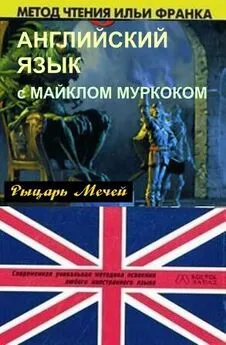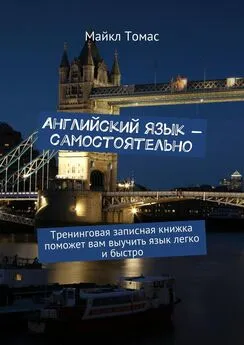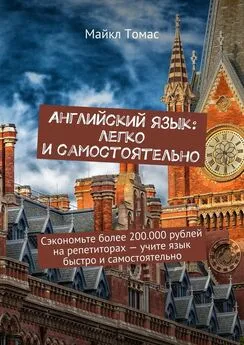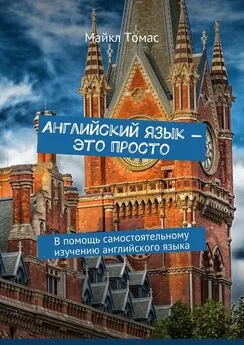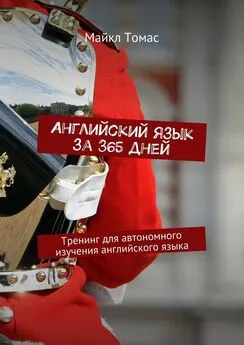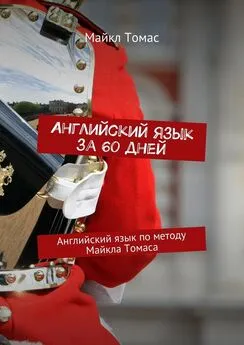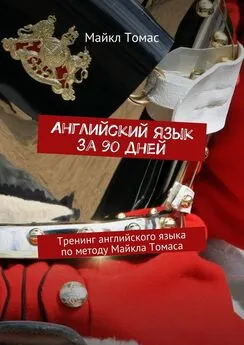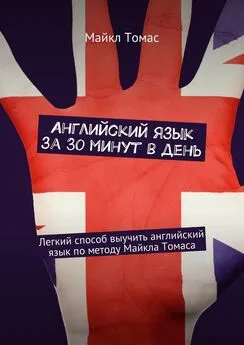Майкл Муркок - Английский язык с М. Муркоком
- Название:Английский язык с М. Муркоком
- Автор:
- Жанр:
- Издательство:неизвестно
- Год:неизвестен
- ISBN:нет данных
- Рейтинг:
- Избранное:Добавить в избранное
-
Отзывы:
-
Ваша оценка:
Майкл Муркок - Английский язык с М. Муркоком краткое содержание
В книге предлагается произведение "Рыцарь Мечей" Майкла Муркока, адаптированные (без упрощения текста оригинала) по методу Ильи Франка. Уникальность метода заключается в том, что запоминание слов и выражений происходит за счет их повторяемости, без заучивания и необходимости использовать словарь. Пособие способствует эффективному освоению языка, может служить дополнением к учебной программе. Предназначено для студентов, для изучающих английский язык самостоятельно, а также для всех интересующихся английской культурой.
Метод чтения Ильи Франка
Английский язык с М. Муркоком - читать онлайн бесплатно полную версию (весь текст целиком)
Интервал:
Закладка:
But this does not mean (но это не значит) that there are some who will not try (что есть такие = не осталось никого, кто не попытается; some — кое-кто, некоторые ) to do battle with and destroy the invulnerable (бороться и уничтожить неуязвимое; to do battle with — бороться с ).
There will always be such beings (всегда будут такие создания; being — cущество, человек ), sometimes beings of great wisdom (иногда создания большой мудрости), who cannot bear to believe in an insouciant universe (которые не могут поверить в безразличную Вселенную; to bear — нести, выдерживать /испытания, боль/, мириться ).
Prince Corum Jhaelen Irsei was one of these (принц Корум Джаелен Ирсеи был одним из этих = из них). Perhaps the last of the Vadhagh race (возможно, последний из расы вадагов), he was sometimes known as The Prince in the Scarlet Robe (он назывался иногда Принц в Алом Плаще; to be known as — именоваться, называться; scarlet — алый, ярко-красный цвет; robe — халат, мантия, одеяние ).
This chronicle concerns him (эта хроника повествует о нем; chronicle — хроника, летопись; concern — касаться, иметь отношение к ).
perpetual [pəˈpeʧuəl] sentient [ˈsenʃnt] favoured [ˈfeɪvəd] deceive [dɪˈsi:v] curse [kə: s]
wisdom [ˈwɪzdəm] insouciant [ɪnˈsu:sɪənt] chronicle [ˈkrɔnɪkl]
But it was a perpetual and familiar injustice. The sentient may perceive and love the universe, but the universe cannot perceive and love the sentient. The universe sees no distinction between the multitude of creatures and elements which comprise it: All are equal. None is favoured. The universe, equipped with nothing but the materials and the power of creation, continues to create: something of this, something of that. It cannot control what it creates and it cannot, it seems, be controlled by its creations (though a few might deceive themselves otherwise). Those who curse the workings of the universe curse that which is deaf. Those who strike out at those workings fight that which is inviolate. Those who shake their fists, shake their fists at blind stars.
But this does not mean that there are some who will not try to do battle with and destroy the invulnerable.
There will always be such beings, sometimes beings of great wisdom, who cannot bear to believe in an insouciant universe.
Prince Corum Jhaelen Irsei was one of these. Perhaps the last of the Vadhagh race, he was sometimes known as The Prince in the Scarlet Robe.
This chronicle concerns him.
The Book of Corum (Книга Корума)
BOOK ONE (часть первая)
In which Prince Corum learns a lesson and loses a limb (в которой принц Корум получает урок и теряет руку)
to learn — учиться, узнавать; to learn a lesson /from/ — извлекать урок; limb — конечность )
CHAPTER ONE (глава первая)
At Castle Erorn (в замке Эрорн)
At Castle Erorn dwelt the family of the Vadhagh prince, Khlonskey (в замке Эрорн обитала семья вадагского принца Клонски; to dwell-dwelt-dwelt ). This family had occupied the castle for many centuries (эта семья занимала замок многие столетия). It loved, exceedingly (она любила чрезвычайно; exceedingly — очень, исключительно ), the moody sea (переменчивое море; moody — легко поддающийся переменам настроения, унылый ) that washed Erorn's northern walls (которое омывало северные стены Эрорна; to wash — мыть/ся/, омывать, стирать ) and the pleasant forest (и славный лес; pleasant — приятный, милый, радостный ) that crept close to her southern flank (что подступал близко к ее /крепости/ южной стороне; to creep — /под/ползать, подкрадываться; to creep-crept-crept; flank — бок, сторона, фланг ).
castle [ˈkɑ:sl] pleasant [ˈpleznt] close [kləus] southern [ˈsʌðən]
At Castle Erorn dwelt the family of the Vadhagh prince, Khlonskey. This family had occupied the castle for many centuries. It loved, exceedingly, the moody sea that washed Erorn's northern walls and the pleasant forest that crept close to her southern flank.
Castle Erorn was so ancient (был настолько древним) that she seemed to have fused entirely (что, казалось, слился полностью; to fuse — плавить/ся/, соединяться, сплавляться ) with the rock of the huge eminence (со скалой громадной высоты; eminence — высота, возвышенность ) that overlooked the sea (которая возвышалась над морем; to overlook — возвышаться /над местностью/, выходить на ). Outside (снаружи), it was a splendour of time-worn turrets (это было великолепие старых: «потертых временем» башенок = прекрасные старые башенки; splendour — блеск, пышность, богатство ) and salt-smoothed stones (и отшлифованные /морской/ солью камни; to smooth — приглаживать, разглаживать, полировать ). Within (внутри), it had moving walls (были подвижные стены) which changed shape in tune with the elements (которые меняли форму в зависимости от погоды; in tune — точно, в тон; elements — элементы; стихия, природные условия ) and changed colour when the wind changed course (и меняли цвет, когда ветер менял направление; course — курс, направление, течение ). And there were rooms full of arrangements of crystals and fountains (были залы, заполненные композициями из кристаллов и фонтанов; room — комната, пространство, зал; full of — полный, наполненный; arrangement — расположение, приведение в порядок, компоновка; crystal — кристалл, хрусталь ), playing exquisitely complicated fugues (игравших изысканно сложные фуги; complicated — запутанный, замысловатый ) composed by members of the family (сочиненные членами семьи; to compose — составлять, сочинять /музыку и др. / ), some living, some dead (некоторые /из которых еще/ жили, другие умерли; living — живой, ныне здравствующий; dead — мертвый, скончавшийся ). And there were galleries (галереи) filled with paintings brushed on velvet (наполненные картинами, написанными на бархате; to brush — чистить щеткой, причесываться; рисовать ), marble and glass (мраморе и стекле) by Prince Khlonskey's artist ancestors (предками-художниками принца Клонски; by — через, посредством ). And there were libraries filled with manuscripts (библиотеки, полные манускриптов; manuscript — рукопись, манускрипт ) written by members of both the Vadhagh and the Nhadragh races (написанных представителями расы как вадагов, так и надрагов; member — член, представитель; both… and… — и… и…, как… так и ). And elsewhere in Castle Erorn (в других местах замка Эрорн; elsewhere — где-то в другом месте; где-либо еще ) were rooms of statues (залы скульптур; statue — изваяние, статуя ), and there were aviaries and menageries (вольеры для птиц и зверинцы), observatories (обсерватории), laboratories (лаборатории), nurseries (детские комнаты), gardens (сады), chambers of meditation (покои /для/ медитаций; chamber — комната, палата, опочивальня ), surgeries (операционные), gymnasia (гимнастические залы; ед. ч. — gymnasium ), collections of martial paraphernalia (коллекции оружия; martial — военный, воинский; paraphernalia — личные вещи, атрибуты ), kitchens (кухни), planetaria (планетарии; ед. ч. — planetarium ), museums (музеи), conjuratoria (залы для занятий оккультизмом; conjuration — заклинание, колдовство, чары ), as well as rooms (были также помещения; as well as — так же как, кроме того ) set aside for less specific purposes (оставленные для менее определенного = не такого специального назначения; to set aside — откладывать /в сторону/, не касаться; purpose — намерение, назначение, замысел ), or rooms forming the apartments of those (помещения, служившие покоями тех = тем; to form — придавать форму, образовывать, создавать; apartment — /меблированные/ комнаты, жилище ) who lived in the castle (кто жил в замке).
fused [fju:zd] eminence [ˈemɪnəns] turrets [ˈtʌrɪts] smoothed [smu:ðd] course [kɔ:s] fountain [ˈfauntɪn] ancestors [ˈænsəstə] statue [ˈstæʧu:] aviaries [ˈeɪvjərɪz] martial [ˈmɑ:ʃl]
Castle Erorn was so ancient that she seemed to have fused entirely with the rock of the huge eminence that overlooked the sea. Outside, it was a splendour of time-worn turrets and salt-smoothed stones. Within, it had moving walls which changed shape in tune with the elements and changed colour when the wind changed course. And there were rooms full of arrangements of crystals and fountains, playing exquisitely complicated fugues composed by members of the family, some living, some dead. And there were galleries filled with paintings brushed on velvet, marble and glass by Prince Khlonskey's artist ancestors. And there were libraries filled with manuscripts written by members of both the Vadhagh and the Nhadragh races. And elsewhere in Castle Erorn were rooms of statues, and there were aviaries and menageries, observatories, laboratories, nurseries, gardens, chambers of meditation, surgeries, gymnasia, collections of martial paraphernalia, kitchens, planetaria, museums, conjuratoria, as well as rooms set aside for less specific purposes, or rooms forming the apartments of those who lived in the castle.
Читать дальшеИнтервал:
Закладка:
